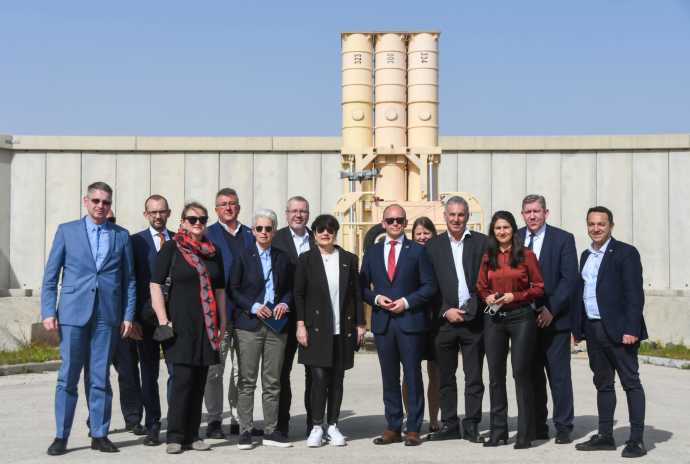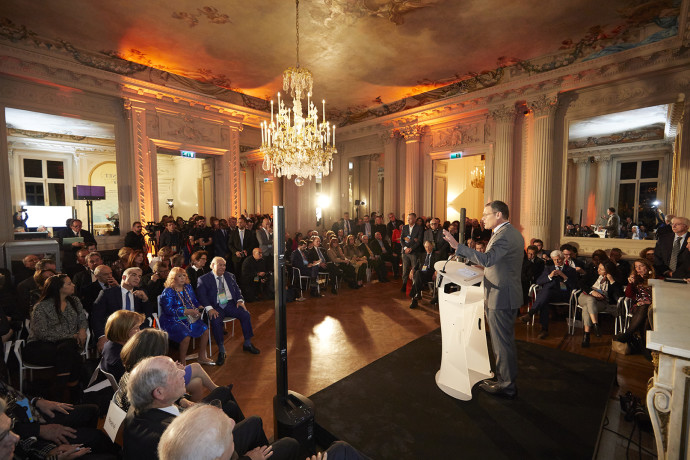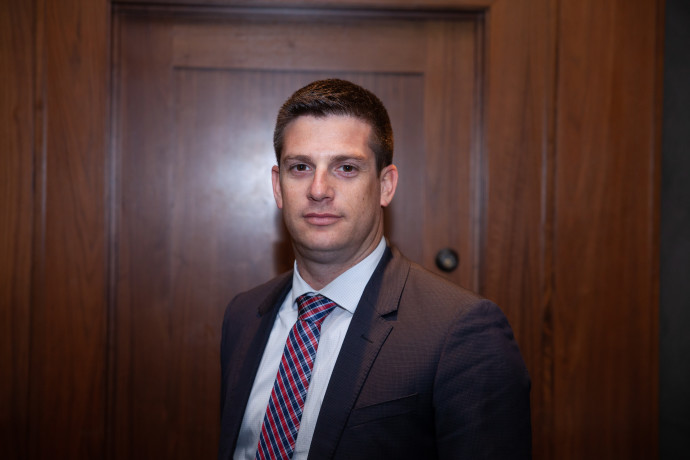‘When you talk about Europe,” says Omri Attar, “the average Israeli on the street will say that Europe is ‘lost’ and antisemitic.” In fact, he explains, the relations between the countries of Europe and the State of Israel are very significant and crucial for both sides.
Attar is the chief operations officer of the European Leadership Network (ELNET), a nonprofit, bipartisan organization dedicated to strengthening relations between Europe and Israel based on shared democratic values and strategic interests. He explained that Europe plays a vital role in Israeli trade, defense, business and education. In a wide-ranging interview with the Magazine, Attar was joined by Daniel Shadmy, research and communications manager at ELNET in Israel.
While many people mention the $3 billion the United States provides in annual defense support to Israel, says Attar, few people are aware that European trade with Israel has reached more than €50b. annually, such as trade agreements and grants to academia. Horizon Europe, notes Attar, is the new grant program that is coming after nearly a decade of fruitful exchange with Israeli Academia, that benefited Israel in billions of euros.

Europe is Israel’s largest trading partner. Half of Israel’s imports come from Europe, and one-third of its exports are sent to Europe. In the last year, notes Attar, a growing amount of Israeli defense technology has been exported to Europe. Fifty percent of Israel’s exports in the defense industry will go toward Europe, he says, particularly in the area of missile defense and the space industry.
Attar adds that Israeli tourism to Europe has increased over the past 10 years since the Open Skies agreement enabled affordable access to the European continent by air from Israel. While COVID-19 travel restrictions impacted that aspect, the number of Israelis traveling to Europe has increased in the past six months, as has the number of Europeans visiting Israel.

ELNET was established in 2010 to bring a pro-Israel policy toward European leadership and strengthen Europe-Israeli relations in the political, cultural, social and financial realms, with the goal of bringing Europe closer to Israel.
The organization’s main hub is based in Israel, and it has branches in Brussels, Paris, Berlin, Warsaw and London, along with fundraising centers in New York, Los Angeles and Chicago. While its European offices actively work with the local governments and officials in their countries, the Brussels office works with the European Union, the European Commission and organizations such as NATO.
To accomplish this, says Attar, the organization facilitates relationships between policymakers in Israel and their European counterparts by bringing European officials and policy influencers to Israel to see the country firsthand and meet with their Israeli colleagues. While ELNET occasionally brings Israeli politicians to Europe, the vast majority of delegations are in the direction of Israel from Europe. Attar says ELNET has brought more than 30 such missions to Israel in the past year.
Some 80% of members of the US Congress have visited Israel – compared to under 10% of European policymakers
“When we bring them here,” he says, “they meet their Israeli partners,” such as members of Knesset, government officials, cultural influencers, IDF personnel and business leaders. European policymakers not only visit the main sights in Israel but are also shown a “geopolitical kind of tour,” as Attar notes, visiting Hezbollah attack tunnels in the North, Israeli Gaza border communities, strategic security briefings from IDF senior officers and meeting MKs at the Knesset.
While 80% of members of the US Congress have visited Israel, Attar says, less than 10% of European policymakers have visited Israel. In addition to bringing lawmakers from each country’s national assembly to Israel, he says, it is also important to bring local leaders such as mayors and governors throughout the continent to the Holy Land.
The purpose of these hands-on missions, says Attar, is to enlarge the network of pro-Israel support within the policymaker’s community and to explain the practical benefits of maintaining closer relations with Israel. ELNET facilitates these encounters among officials on both sides to engage them in personal and meaningful relationships.
One such project that ELNET is promoting, says Attar, is bringing Israeli medical technology to the German Ministry of Health to promote and improve their health system. A second project, says Shadmy, ELNET’s research and communications manager, is assisting the vast number of refugees in Poland who have fled Ukraine.
“We brought two world-renowned Israeli trauma prevention and community resilience experts to Poland.” Shadmy says the Israeli experts went to Poland to train local staff to build community resilience and assist the millions of Ukrainian refugees there. Attar adds that the program was praised and endorsed by President Isaac Herzog and his wife, Michal, and Olena Zelenska, wife of Ukrainian President Volodymyr Zelensky. “We became the main channel of communication between the Israeli and Polish governments, especially when the official channels were down. That’s where our added value and leadership network come into action,” says Attar.
A third area cited by Shadmy in which ELNET has acted as a facilitator involves sustainability. In October, a joint French-German delegation – which is the first time a joint delegation between the two countries is going to a third country – will arrive in Israel to learn from Israeli officials and gain expertise in sustainability and greentech. The parliamentarians are set to meet with Prime Minister Yair Lapid, relevant ministers and several other high-level officials, MKs and business leaders to discuss how the three countries can cooperate and build mutual projects, as well as how Israeli technology and innovation in sustainability can be helpful in their home countries.

A practical example of ELNET assistance, notes Shadmy, was demonstrated by a visit of parliamentarians from Poland and the Baltic states. “A member from Estonia in charge of his country’s national resilience came here because they don’t have any air-raid alarms,” he says. This issue took on particular importance in light of the Russian invasion of Ukraine. “We connected him to the proper officer in charge of that specific matter,” he continues, “and the delegation met with the IDF Home Front Command officer, who provided further information about the desired system, which led to an official defense exchange between the countries”.
In addition to promoting overall cooperation with European leaders, ELNET promotes bilateral and trilateral ties between European countries and Israel by organizing high-level off-the-record strategic dialogues. Later this year, ELNET will be hosting a strategic dialogue with Germany to be held in Israel and an additional event with the European Union here. The following year, these bilateral talks will be held in Europe.
In November, ELNET will organize a series of trilateral strategic dialogues between officials from the US, Israel and Europe in Washington, D.C., to discuss the importance of strategic relations between Europe and Israel. In addition, the organization is planning a second trilateral strategic dialogue between the United Arab Emirates, Europe and Israel, to be held in Abu Dhabi, to discuss the significance of the Abraham Accords for Europe.
Shadmy notes, “We are the only organization that holds a policy conference in Europe about relations between Europe and Israel.” In May 2023, the organization will conduct the ELNET International Policy Conference in Paris to discuss pressing current geopolitical issues, hosting top level officials from all around the world and promoting strategic relationships for the benefit of Israel in Europe.
While ELNET works in the area of public diplomacy, Attar points out that its only agenda is promoting Israel in Europe and vice versa. “ELNET is not promoting any political agenda,” he says. “We are a bipartisan organization, and we facilitate relationships between officials and experts on a non-official basis.” He notes that while the organization works in public diplomacy, they are not official diplomats.
Attar notes that official diplomacy is frequently termed “track one,” while unofficial diplomacy is called “track two.”
“We regularly address our work as track one and a half,” he smiles. This type of informal, unofficial diplomacy encourages participants to develop breakthrough ideas and engage in joint brainstorming toward enhanced bilateral cooperation and honest relationship building.
In Attar’s view, ELNET is the go-to organization for Europe-Israel relations. To that end, he says, “We work with policymakers, officials and policy influencers from academia, research institutions, cultural leaders and influencers.
Our core mission is to bring Europe closer to Israel on the policy and political side. That made ELNET the largest pro-Israeli organization working in Europe, and we are growing rapidly.”
The last several years have shown how Israel can assist Europe in many areas, he says, such as policy, defense, culture, national resilience and even education. “The opportunities for Israel and Europe are enormous.”
This article was written in cooperation with ELNET.
